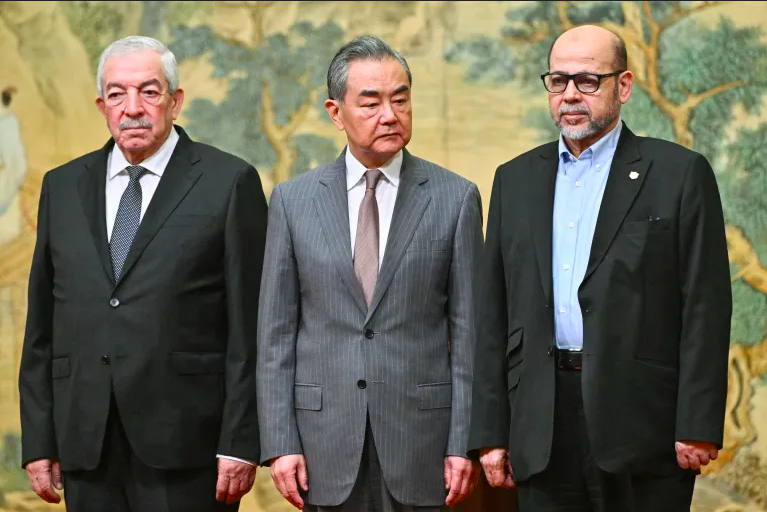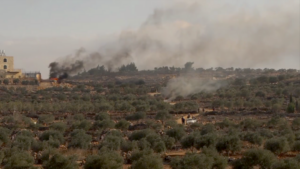
Published 23/07/2024 15:57 | Edited 23/07/2024 16:20
Palestinian groups have signed a “national unity” agreement aimed at maintaining Palestinian control over Gaza after Israel’s war on the enclave ends. The deal, finalized in China on Tuesday after three days of intensive talks, lays the foundation for an “interim government of national reconciliation” to govern post-war Gaza, Chinese Foreign Minister Wang Yi announced. The agreement was signed by longtime rivals Hamas and Fatah, as well as 12 other Palestinian groups.
“Today we signed an agreement for national unity and we say that the way to complete this journey is national unity,” senior Hamas official Mousa Abu Marzouk told a news conference in Beijing.
The text states that Palestinian organizations advocate the “establishment of an independent Palestinian state with Jerusalem as its capital, in accordance with UN resolutions, and guarantee the right of return in accordance with Resolution 194,” which provides for the return of refugees to their homes.
Mustafa Barghouti, secretary general of the Palestinian National Initiative, one of the 14 political groups to sign the agreement, told Aljazira that the agreement goes “much further” than any other reached in recent years. He highlighted four main elements: the establishment of an interim national unity government, the formation of a unified Palestinian leadership ahead of future elections, the free election of a new Palestinian National Council, and a general declaration of unity in the face of ongoing Israeli attacks.
The move toward a unity government is especially important, Barghouti said, because it “blocks Israeli efforts to create some kind of collaborative structure against Palestinian interests.” Reconciliation between Hamas and Fatah would be a fundamental turning point in internal Palestinian relations. The two main Palestinian political parties have been rivals since 2006, when Hamas took control of Gaza.
“We are at a historic juncture,” Abu Marzouk said, according to CNN. “Our people are rising up in their efforts to fight.” Hamas, which led the Oct. 7 attack on Israel, advocates armed resistance to Israeli occupation. Fatah, which controls the Palestinian Authority with partial administrative control of the occupied West Bank, favors peaceful negotiations toward a Palestinian state. Unlike Hamas, Fatah recognizes the existence of Israel and believes in a two-state solution for peaceful coexistence.
Reactions to the agreement
Barghouti stressed that the war in Gaza was the “main factor” motivating the Palestinian sides to put aside their differences. “There is no other way now, unless the Palestinians are unified and fight together against this terrible injustice,” he said. “The most important thing now is not only to sign the agreement, but to implement it.”
Israel is vehemently opposed to any role for Hamas in governing Gaza and, despite opposition from Washington, has suggested it intends to maintain control of the enclave. Israel was quick to criticize the announced deal. Foreign Minister Israel Katz criticized Mahmoud Abbas, the head of Fatah and president of the Palestinian Authority, for cooperating with Hamas, reiterating that no one but Israel will control Gaza after the end of hostilities. “In reality, this will not happen because the Hamas government will be crushed and Abbas will be watching Gaza from afar. Israel’s security will remain in Israel’s hands alone,” Katz said.
Chinese mediation
Both Europe and the US support Israel in implementing strategies to keep the Palestinian parties in permanent hostility with each other, and would therefore never encourage this type of agreement. For them, it is essential to feed the narrative that Hamas is a terrorist group and needs to be exterminated, while keeping other groups submissive to Israeli colonialism.
China, seeking to play a mediating role in the conflict, had already hosted Fatah and Hamas in April. During these talks, the political groups expressed their willingness to achieve reconciliation through dialogue and made progress on many specific issues. The latest round of negotiations was attended by Hamas political leader Ismail Haniyeh and Fatah deputy head Mahmoud al-Aloul.
After signing what has been called the “Beijing Declaration,” Wang Yi declared, “Reconciliation is an internal matter for the Palestinian parties, but at the same time, it cannot be achieved without the support of the international community.” Historically sympathetic to the Palestinian cause, China supports a two-state solution to the Israel-Palestine conflict. Chinese President Xi Jinping has called for an “international peace conference” to end the war.
conflict period
Hamas is considered a terrorist group by the United States, the European Union and Israel. It was created in 1987 during the first intifada, which was a Palestinian uprising against the Israeli occupation. It is an Islamic fundamentalist and nationalist group that operates in Gaza.
Fatah was founded in Kuwait in 1959 by members of the Palestinian diaspora and is considered the largest Palestinian political party, in addition to having a military wing. Fatah is nationalist, secular and operates in the West Bank. It is the largest group in the Palestine Liberation Organization (PLO), and among the main names that have passed through the group are Yasser Arafat and Mahmoud Abbas.
In the 2006 elections, Hamas won the majority of seats in the Palestinian National Council. This would have enabled the group to form a government for the Palestinian territories. However, the victory was not accepted by Israel and the European Union, which partly financed the Palestinian Authority.
The countries imposed sanctions, which intensified the rivalry between the local parties. So much so that Fatah dissolved the council, taking control of the Palestinian Authority in the West Bank, while Hamas formed its own government and took control of the Gaza Strip.
Furthermore, the crisis resulted in a war in 2007. Hundreds of people were killed or injured. The conflict ended with the expulsion of Fatah from the Gaza Strip.
Several past reconciliation proposals between the two sides have failed. However, the escalating war has intensified calls for unity. Israel and its allies, including the United States, are arguing over who could govern Gaza after the fighting ends.
This national unity agreement represents a significant step towards Palestinian reconciliation and stability in the region, despite the challenges and criticisms faced.
Source: vermelho.org.br

